Table of Contents
German police forbid ‘speaking Irish’ at Berlin protest — Free Speech Dispatch April 2024

Last month, FIRE launched the Free Speech Dispatch, a regular series covering new and continuing censorship trends and challenges around the world. Our goal is to help readers better understand the global context of free expression. The previous entry addressed global takedowns out of India, repression in Hong Kong, and worrying legislation in Canada. And this week, we’ll look at a series of troubling censorship allegations across Europe, extensive online restrictions in China, and Iran’s campaign against its critics.
Protesters in Germany better watch their tongues (literally)
To put it mildly, Germany has not handled protests about the Israeli-Palestinian conflict well in recent months, and regular accusations of censorship have emerged from across the country. More allegations surfaced this month when Berlin police shut down — and cut off power to — a Palestine Congress conference over “the potential for hate speech.”
Authorities specifically cited the risks of a speech broadcast by video from Palestinian author Salman Abu Sitta, who police said has “in the past made antisemitic and violence-glorifying remarks” and is “forbidden from being politically active in Germany.” One of the event’s co-organizers, Jewish Voice for a Just Peace in the Middle East, alleges police detained two of its members, one for holding a “Jews against genocide” sign outside.
And last Friday, Berlin police again shut down a pro-Palestinian protest, this time for a less expected reason: Demonstrators were speaking an unpermitted language. According to the Irish Independent, police dispersed the event of “about 40 Irish people living in the German capital, under rules that only allow English and German, and in some cases Arabic, to be used during protests.” One protester, who accused police of also cracking down on protests in Arabic, said police were “worried that we, in Irish, would say something that glorified terrorism or incited violence” and, because they did not provide an interpreter, “were banned from speaking in Irish.”
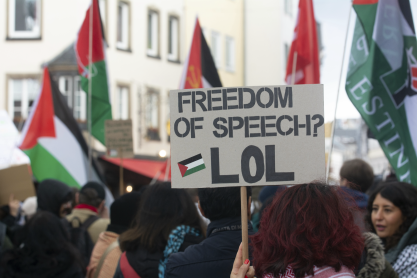
Belgian mayor tries to shut down National Conservatism Conference
Emir Kir, mayor of Brussels’ Saint-Josse-ten-Noode neighborhood, attempted — ultimately unsuccessfully — to close down the National Conservatism Conference last week, citing the need to “guarantee public safety.” Speakers at the event included Hungarian Prime Minister Viktor Orbán, a close ally of Vladimir Putin, and U.K. politician Nigel Farage, a prominent supporter of the Brexit movement.
Police arrived during Farage’s April 16 speech and announced that “authorities have decided to shut down the event.” Organizers of the conference encountered trouble even before it began when at least one hotel refused to host it after being pressured by another mayor in Brussels.

But these efforts failed, with Belgium’s supreme administrative court issuing an order the following day affirming the right to free expression and suggesting efforts to censor it for perceived safety concerns “derived purely from the reactions that its organisation might provoke among opponents.”
This reliance on nebulous “safety” claims and potential threats of violence is a common pretext for censorship, even in the United States. Last week, University of Southern California leadership offered similar justification for its cancellation of class valedictorian Asna Tabassum’s commencement speech following online criticism of comments she had made about Israel. Such a result permits the heckler’s veto to determine who can and cannot speak — or it allows authorities to use potential heckling or violence as a pretext for disallowing speakers.
Correctional labor sentence for Belarusian dissidents
Earlier this month, Belarusian authorities convicted Alyaksandr Ilyin, Siarhei Kulsha and Dzmitry Khalyaukin, members of rock band Nizkiz, of “organizing and plotting actions grossly violating public order” and sentenced them to two years of correctional labor. These charges are the latest in President Alexander Lukashenko’s years-long crackdown on anti-government protests in the country.
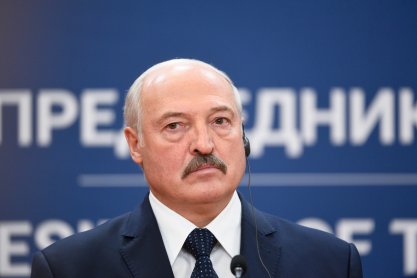
Nizkiz, whose music is also now banned due to its inclusion on the country’s list of registered extremists, became a figure in Belarus’ demonstrations with its 2020 protest song “Rules” and later filmed a music video for the song at a protest.
Messaging apps disappear from Apple’s app store in China
China is known for its extensive internet restrictions and, as of this month, more apps joined the censored list. Amid the backdrop of American legislators’ efforts to force TikTok to divest from Chinese company ByteDance or face a ban in the U.S., Chinese government officials ordered Apple to remove Meta’s WhatsApp and Threads from its app store in China. Apple complied, stating the company was “obligated to follow the laws in the countries where we operate, even when we disagree.” Apple tends to comply with orders from the Chinese government without challenge, and the company’s alleged unwillingness to allow Jon Stewart to critically discuss the country in his Apple TV+ show reportedly contributed to the show’s early end.
The government’s orders to Apple followed officials’ discovery of unspecified content about Xi Jinping on the apps “that was inflammatory and violated the country’s cybersecurity laws.” Signal and Telegram were also removed from the app store due to national security concerns. These moves will further limit Chinese citizens’ already heavily restrained access to information and communication tools.
Iranian censorship at home — and in the UK?
On April 13, Iranian cartoonist, activist, and frequent censorship target Atena Farghadani was arrested on charges of “blasphemy,” “disturbing public order,” and creating “propaganda against the Islamic Republic.” She had reportedly displayed her artwork publicly in Tehran, leading to her arrest, and has since rejected bail in protest.

But it isn’t only dissenters within the country that are at risk. Late last month, London-based Iran International journalist and government critic Pouria Zeraati was stabbed outside his home by a group of men who fled the country immediately after the attack. Zeraati survived and is now living in a safe house, but investigators do not believe the act of violence was random. Instead, the case is being handled by the Metropolitan Police Counter Terrorism Command.
Zeraati joins a group of over a dozen U.K.-based individuals who have faced recent violence or threats likely linked to the Iranian government. Iran International spokesperson Adam Baillie said the organization is on “high alert” and views the stabbing as “a very clear warning.” This is one of today’s worst free speech challenges — authoritarian governments that operate with impunity not just within their own borders, but on a global scale.
Stay tuned for more updates from the Free Speech Dispatch.
Recent Articles
FIRE’s award-winning Newsdesk covers the free speech news you need to stay informed.
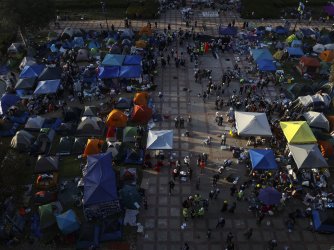
Campus encampment bans rarely violate the First Amendment. Here’s why.
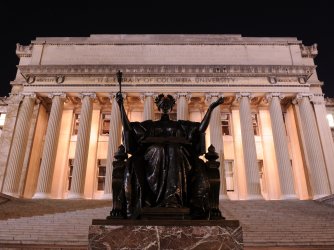
University provosts have bleak outlook on free expression in higher ed
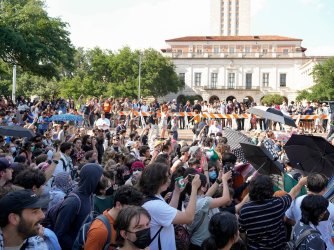
With colleges punishing student protesters, campus due process is more important than ever


